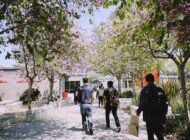I, like many others, ran into the trouble of not being able to focus back in my hometown with my family, so I moved back to Northridge.
By LESLIE VALLE
EL NUEVO SOL
It all happened in a blink of an eye, one moment to the next students spent their average college days going to and from classes, work and home, but then COVID-19 forced students to change what was once their reality.
Being one of thousands of students that were forced to quarantine back in their hometowns when the pandemic first started, I was so happy to go back to my hometown and spend time with my big family, but I was not so happy when plans with moving forward into the school year was released shortly after our spring break.
When California State University, Northridge announced that the remainder of the spring 2020 semester and the upcoming school year would be completely online, multiple concerns popped into my head. “How will I adapt from home?”, “Are the curriculums going to be the same considering we’re fully online?”, “I have a big family, how will I be able to focus at home?”, but the most concerning of all, “I don’t have wireless internet access at home…what will I do?”. Immediately I began to panic.
Spring break was starting to come to an end and I found a solution to my internet problem, I would simply use my phone’s hotspot. This solution was not long term how I anticipated it to be. Not only was my laptop connected to my hotspot, but so were my little brothers’ laptops. I could not use my phone while I had the hotspot on or else it would not work as efficiently, zoom calls would go in and out because of the poor internet connection and due to the fact that there were three devices connected to the hotspot. The gigabytes I once had went away in a blink of an eye, it was only enough to last me and my siblings two days before we had no wireless internet, again. I then decided to talk to my parents about getting wireless internet at home.
After sitting down and talking with my parents about my concern, they were quick to find which internet service would fit our household the best. Luckily, this was during the beginning of the pandemic and multiple carriers offered promotions for households that had students. Each company ranged from getting three months of free internet access to paying as low as ten-dollars a month for the most basic plan.
Later on, toward the end of the semester, I made the decision to move back to Northridge after staying in quarantine for the remainder of the 2020 spring semester. I, like many others, ran into the trouble of not being able to focus back in my hometown with my family, so I moved back to Northridge.
Fast forward to the beginning of the 2020 Fall semester at CSUN, I encountered another internet problem. The power went out in my apartment for two days and there I was again, scrambling to find a way to make it to class through my laptop. Instantly, I fell back in reliance on my hotspot only to then find out that I had used all my gigabytes to be able to use it.
Now here I was again trying to figure out how to get internet access during a pandemic that was running through my mind. My power outage only lasted two days, but throughout those two days I fell behind 4 class lectures. Thankfully, I was able to email all my professors and they were all understanding of my situation and I was able to catch up. Though I was able to catch up.
I am one out of many that have experienced internet issues that are out of their control. Jasmine Mandujano, third year at CSUN, experienced problems with her router and no one in the house could connect to the internet. “We had to get a new box and it was a whole process and we have had trouble, it’s not as reliable as being in class and having a professor,” she said anxiously.
Given that we are in a pandemic, many services including CSUN’s, might take a bit longer to try to assist one with their needs. Representative from T-Mobile, Kendrick said “When someone or a school calls for a request to get a router, it can come within the next day to day, 7 business days, or a few weeks now with shipping being delayed”.
Many students have confided in their schools as a safe haven for their needs of the internet and even mental health. CSUN has been active all around the board to be able to meet the needs of the student body as well as finding new ways to accommodate the current crisis.
As a first-generation college student, I started out at CSUN eager because I knew that I had just accepted being a student in one of the best CSU campuses yet. The need and drive to provide the best for the student body is what makes CSUN not only a campus, but a community. While reaching out to my professors each of them sent me resources that were either no cost or at very low prices.
Here below are a few resources that are little to no costs for students.
- The CSUN Campus Bookstore offers device and hotspot rentals for up to the whole Fall 2020 semester or however long is needed.
- CSUN with a heart provides multiple free and low costs resources for any Matador in need. By giving them a call or email with your need(s), they can help with what works best for you.
- The CSUN USU also has empty study rooms available by the ticket office.
- The Extended University Commons building also known as The Hub is also open to allow students to sit inside with a desk to themselves to abide by CDC guidelines of social distancing.
- T-Mobile has a 30-day free trial with no contracts for a hotspot device that is best compatible for you.
- Spectrum offers a $49.99 plan for 200 Mbps, which is their basic high speed internet plan for a month.
Tags: CSUN internet problems Leslie Valle remote learning





















